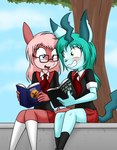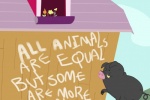
Copyright: animal farm
Animal Farm is a novella by George Orwell, about farm animals that revolt against their human masters to rule themselves. Written between November 1943–February 1944 and first published in England 17 August 1945, the book is an allegorical satire of the history of the Soviet Union, from the Russian Revolution of 1917 to the rise of Stalinist totalitarianism and the Second World War. Orwell, a democratic socialist and veteran of the Spanish Civil War, opposed Stalinism and Moscow's influence over international Leftist movements, and wrote the book in part to counteract Britain's wartime willingness to overlook the brutality of the Soviet regime. Aptly enough, lobbying by Soviet agents within British literary circles and even the Ministry of Information contributed to Orwell's difficulty in finding a publisher. Animal Farm was retroactively given the Hugo Award for Best Novella in 1996, was selected for Time magazine's 100 best English-language novels (1923–2005), and was placed 31st in the Modern Library List of Best 20th-Century Novels.
Orwell's 1949 novel Nineteen Eighty-Four can be seen as a spiritual successor.
Plot synopsis
The story takes place on an English manor farm. The prize boar "Old Major" summons the animals one evening and expounds his vision of a farm run by and for animals, free from human exploitation. After Old Major's death, the pigs Napoleon and Snowball take up the mantle and lead the animals in revolt, driving out the cruel Mr. Jones, his wife, and other farmhands. The Manor Farm is renamed "Animal Farm" and adopts the Seven Commandments of Animalism, the first being "All animals are equal." Initially, the farm is prosperous; the pigs assume the role of leadership and claim extra food rations, ostensibly for their health.
Mr. Jones and several neighbouring farmers fearing revolution among their own livestock launch an attack to retake the farm. Snowball leads a successful ambush, and the "Battle of the Cowshed" earns him enormous popularity, becoming an annual holiday. Snowball and Napoleon enter a struggle for the farm's leadership; Snowball proposes building a windmill to improve efficiency and power barnyard amenities, which Napoleon repeatedly dismisses, filibustering Snowball's speeches with mindless shouting by the sheep that "Four legs good, two legs bad!" During one meeting, Napoleon sics attack dogs on Snowball, chasing him from the farm; Napoleon declares himself leader, claiming the windmill was his own idea and imploring the animals to work harder, a mantra taken to heart by the beloved but simple-minded workhorse Boxer.
Under Napoleon, the common meetings are replaced by closed councils amongst the pigs. Snowball is scapegoated for repeated setbacks in the windmill's construction, and animals suspected of collaboration are subjected to show trials and publicly executed. Despite a previous pledge not to trade with humans, the pigs begin selling food for outside supplies; when the hens attempt to strike against forced confiscation of their eggs during a lean year, the coop is besieged and many die of starvation. In the start of a steady pattern of historical revisionism, Napoleon claims credit for the Battle of the Cowshed, and the revolutionary hymn "Beasts of England" is replaced with a new anthem glorifying Napoleon. Although the pigs begin to adopt a lifestyle similar to the humans they deposed, the animals still believe they are better off than under Mr. Jones.
Napoleon concludes a deal to sell a load of timber to Mr. Frederick, despite the farmer's reputation for cruelty and rumours he is plotting an attack on the farm, only to be paid with forged bills. Frederick leads a better-organized attack, driving the animals back long enough to dynamite the windmill. Frederick's men are ultimately routed, but at heavy cost to both sides. Reconstruction of the windmill begins; while most animals suffer further cuts to their rations, the pigs claim more privileges and Napoleon's cult of personality is strengthened. Boxer exhausts himself working on the windmill, but instead of retiring, he is sold to a slaughterhouse; the pigs' propagandist Squealer insists, however, that he was taken to a veterinarian and died in hospital.
Over the years most of the original animals die off, and both Snowball and Boxer are largely forgotten, with new generations fully indoctrinated into Napoleon's revisionist Animalism. Although the windmill is rebuilt, it is used for milling instead of electricity, and the original promise of farmyard amenities is quietly abandoned. Despite acquiring new fields and improved production techniques, the farm's prosperity does not change the animals' poor standard of living. Completing their usurpation of the old ruling class, the pigs begin walking upright and wear clothes; the sheep are coached into a new mantra, "Four legs good, two legs better!" and the First Commandment is amended to "All animals are equal, but some animals are more equal than others." Napoleon hosts a dinner with the heads of neighbouring farms in which he promises peaceful relations, declaring the old revolutionary symbols and rituals will be erased, and addressing Animal Farm as "The Manor Farm". However, a fight erupts when Napoleon and Mr. Pilkington both draw an ace of spades in cards; observing from outside, the animals can no longer tell who is human and who is a pig.
Principal characters and historical counterparts
- Mr. Jones – The original owner of the Manor Farm, representing Imperial Russia. Drunk and abusive, Jones has let the farm run into disrepair at the hands of negligent workers, analogous to the corrupt and ineffective rule of Czar Nicholas II. He is driven off the farm by the animals' revolution, leads a failed attack to take it back (representing the Russian Civil War), and ultimately dies in exile, ridiculed by his peers.
- Old Major – Mr. Jones's prize boar, representing both Karl Marx and Vladimir Lenin: he inspires the animals to revolution but dies before it takes place; his skull becomes a public monument, analogous to Lenin's Mausoleum in Red Square.
- Snowball – A charismatic boar and presumptive leader of Animal Farm following the revolution, representing Leon Trotsky. He is hailed as a hero for his leadership in defending the farm from Mr. Jones's reprisal and originally proposes the Windmill to improve living standards, but is chased out by Napoleon's machinations and is subsequently scapegoated for the farm's misfortunes.
- Napoleon – A Berkshire boar, reserved but manipulative, representing Joseph Stalin. Napoleon initially dismisses Snowball's ideas before running him off the farm to secure its leadership, then subsequently claims the Windmill as his plan all along. Under him, the pigs gradually usurp the humans' role as undisputed masters of the farm (representing the Communist Party nomenklatura), frequently revising the Commandments of Animalism to suit their own selfish aims.
- Squealer – Napoleon's deputy, a persuasive orator who becomes the spokesman for the pigs as Napoleon steadily withdraws from public life. Convinces the animals that the pigs' propaganda is the truth, analogous to Vyacheslav Molotov and state-controlled media such as Pravda.
- The Puppies – A litter born to the sheepdogs Jessie and Bluebell after the revolution, they are seized by Napoleon and raised as the pigs' attack dogs and security detail, re-emerging fully-grown to chase Snowball from the farm. Represent the NKVD, Stalin's secret police.
- The Young Pigs – Four pigs that protest Napoleon's termination of public debates soon after his ousting of Snowball. They are immediately murdered, similar to the "Old Bolsheviks" in the Great Purge.
- Boxer – The farm's workhorse, strong, kind, and loyal, but extremely naïve. He once challenged the claim that Snowball was a traitor to the farm and fought off an attack by the dogs, but ultimately adopts the maxim that "If Comrade Napoleon said it, then it must be true." Representing the Stakhanovite movement, he labours relentlessly with disregard to his own health and ultimately invalidates himself repairing the Windmill after Frederick's attack. Rather than retire on pension as was promised, he is sold to a knacker, with the pigs using the profits for whiskey.
- Mollie – A young, vain, and self-centred mare; she hides during the Battle of the Cowshed and subsequently flees the farm for a new human master after being enticed with sweets. Represents the anti-Communist emigrés following the Revolution and Civil War.
- Benjamin – An old and wise donkey and one of the few fully-literate animals, but cynical and pessimistic to a fault, generally refusing to engage with the animals even though he seems to recognize the pigs' duplicity. Some scholars suggest Benjamin is an avatar of Orwell himself, who was called "Donkey George" by his friends after the book's publication. His one major action is to rally the animals to rescue Boxer from the slaughterhouse, but the horse is too exhausted to break out of the wagon.
- Moses – Mr. Jones's pet raven, a gifted storyteller who regales the animals with images of the paradise land "Sugarcandy Mountain". He is the only animal absent from Old Major's speech, and generally disliked by the animals as he does no work; he flees with the Joneses during the revolution, but returns to the farm after the Battle of the Windmill, and despite remaining a layabout is tolerated by the pigs. Moses embodies both the general Marxist critique of institutional religion as the "opiate of the masses", and the Soviet co-option of the Russian Orthodox Church during and after World War II.
- The Hens – Despite promises they would keep their eggs, after opening trade with neighbouring farms Napoleon orders the eggs seized to meet food export quotas in the midst of a lean year. They attempt to strike, destroying their clutches out of spite, but are brought to heel in a starvation campaign by Napoleon that claims nine hens; the ringleaders are subsequently executed during a show trial. Analogous to the Holodomor, seizure of Ukrainian crops during the Soviet famine of 1932–33.
- Mr. Pilkington – An easygoing "gentleman farmer" whom the animals nevertheless distrust on principle. Owner of Foxwood, a large but overgrown farm analogous to the Western Allies, likely the British Empire specifically. Hates Frederick but does not intervene when he attacks the farm, possibly in reference to Soviet conspiracy theories that the Allies deliberately delayed opening the second front in Europe.
- Mr. Frederick – A cutthroat businessman and litigator, ill-reputed for exceptional cruelty to his livestock. He takes personal offence to the Windmill, destroying it in a bloody raid on Animal Farm late in the story. Owner of Pinchfield, a small but efficiently-run farm analogous to the Axis, specifically Nazi Germany (the name itself may be a pun on Hitler's platform of lebensraum). Hates Pilkington.
Animal Farm has been adapted for film twice, both controversially deviating from the book's bleak ending:
- The first film was a 1954 co-production between Britain and the United States, and was Britain's first feature-length cinematic animated film. Narrated by Maurice Denham, it is generally faithful to the original story, modifying some plot points and sidelining and/or removing several minor characters. Production was secretly funded by the Central Intelligence Agency as part of its Cold War propaganda campaign, which influenced several of the changes: most prominently, the film ends with the animals rising up in a new revolution to overthrow the corrupt pigs.
- The second film was a 1999 made-for-TV live action/CGI British–American co-production featuring a celebrity voice cast. A looser adaptation of the book, it received mixed critical reception, considered too dark for children and too familiar and unsubtle for adults. Like the 1954 film, the ending is altered: the farm collapses within a single generation with Napoleon and most of the animals dead; Jessie reunites with her children and vows to prevent the survivors from repeating their mistakes as the farm is taken over by a new human family.
- Additionally, Andy Serkis announced plans to create a film adaptation in 2012; in 2018 Netflix acquired the rights, with production continuing under Serkis's company The Imaginarium.
Posts (view all)

